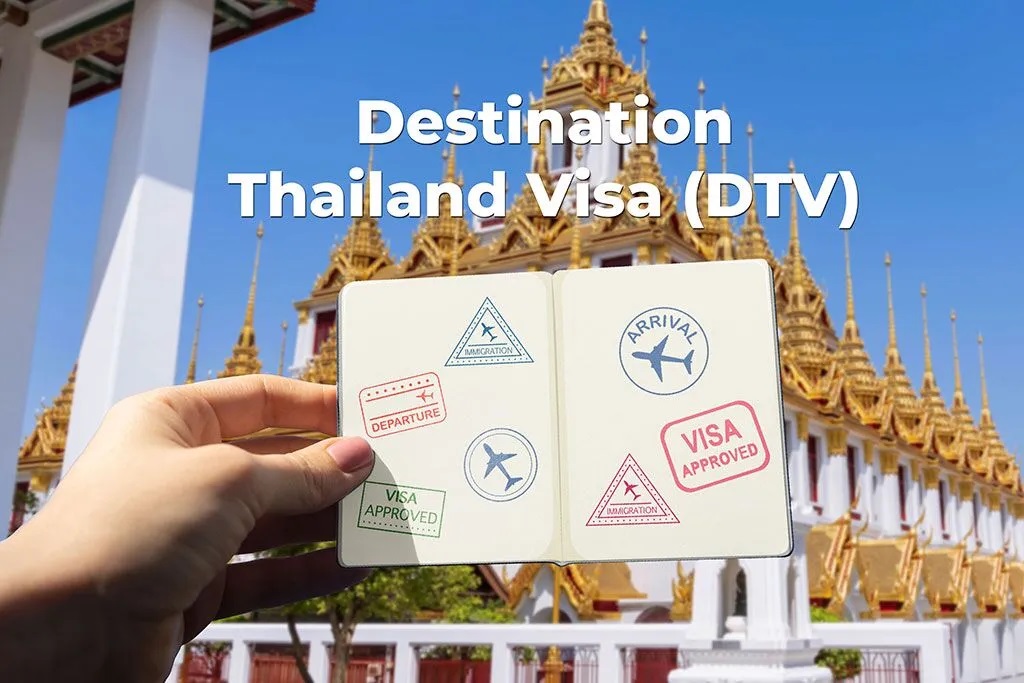Thailand now offers a clear route for remote professionals who want to spend extended time in the country. The Destination Thailand Visa, or DTV, creates a formal structure for remote work and workcation stays, replacing uncertain short-term options with a defined pathway. It sits apart from tourist visas and the Long-Term Resident Visa, with its own rules, duties, and benefits that applicants must understand before applying.
This guide explains the purpose of the DTV, who qualifies, how to apply, the length of stay, and the tax position that comes with longer visits. It also highlights the difference between the DTV and the LTR Visa, so applicants can choose the right route for their plans.
What the DTV Offers and How Long it Lasts
Launched in 2024, the Destination Thailand Visa is built for modern, mobile professionals. It is a multiple-entry visa with a five-year validity. The visa is designed for people who work for foreign employers, run overseas businesses, or freelance for clients outside Thailand.
Key features of permitted stay per entry:
- Initial permission to stay is up to 180 days.
- A single extension of a further 180 days may be requested inside Thailand, giving up to 360 days on one visit.
The five-year, multi-entry model suits people who want flexibility. Holders can leave and re-enter during the five years, then apply for the 180-day stay on each entry, subject to immigration rules.
Who Can Apply for the DTV
The DTV is aimed at remote workers, freelancers, and entrepreneurs working for or with non-Thai businesses. Applicants must be at least 20 years old, show genuine professional activity, and prove financial capacity.
Professional status
Applicants must clearly fall into one of the following groups, with income sourced from outside Thailand:
- Remote employees with a foreign employment contract.
- Freelancers or contractors with evidence of ongoing projects, contracts, or a professional track record.
- Owners or directors of a business registered outside Thailand.
Financial evidence
The DTV sets a clear financial standard that is lower than the LTR Visa but still firm:
- Bank statements must show at least THB 500,000 at the end of each month over the previous three months. This shows the applicant can support themselves while in Thailand.
- Supporting income documents are required, such as recent payslips, contracts, or company registration documents.
Family members
Spouses and children under 20 may apply as dependents of the main applicant. This allows families to stay together under the DTV framework.
How to Apply for the DTV
Applications can be made online via the official Thai e-Visa system or at a Royal Thai Embassy or Consulate-General in the applicant’s home country or place of legal residence. The DTV is not available for conversion inside Thailand from another visa type.
Documents typically required for the Workcation category
- A passport valid for at least six months from the intended date of travel.
- A completed visa application and a recent passport-style photograph.
- Proof of current residential address, for example, a driving licence, utility bill, or bank statement.
- Bank statements for the last three months showing the minimum THB 500,000 balance at month end.
- Evidence of professional status:
- Employees: a valid foreign employment contract and an employer letter confirming the remote role.
- Freelancers or entrepreneurs: a portfolio, client contracts, invoices, or foreign company registration.
- Health insurance with coverage in Thailand.
Government fees
The published fee is typically around THB 10,000. The amount may vary by country and exchange rate, so applicants should check the local embassy or e-Visa platform.
What the DTV Allows, and What It Does Not
The DTV’s permissions are tied to immigration and labour rules. Holders should understand where they stand on work rights in Thailand.
- Remote work for foreign employers or clients is allowed without a Thai work permit. The key condition is that income must come from outside Thailand.
- Local employment is not allowed. DTV holders cannot take a job with a Thai company or provide services to local clients where that activity counts as work in Thailand. Anyone who wants to work for a Thai entity must switch to the correct status, usually a Non-Immigrant B visa along with a work permit, and give up the DTV.
- The DTV is not a residency or work visa in the same sense as the LTR Visa. It is classed as an extended-stay option for non-immigrant visitors, with strict limits on local work.
Tax Position for DTV Holders
Tax is a key area for anyone using the DTV. The length of stay and the handling of foreign income can bring Thai tax obligations into play, especially under recent changes to the Thai Revenue Code.
When tax residency applies
An individual is treated as a Thai tax resident if they spend 180 days or more in Thailand within a calendar year, counted from 1 January to 31 December. This rule applies regardless of visa type.
- A DTV holder who extends to stay beyond 180 days in a year will likely become a Thai tax resident for that year.
- Tax residents must obtain a Thai Tax Identification Number and file an annual personal income tax return.
How foreign-sourced income is taxed
Thailand has updated the treatment of foreign-sourced income for tax residents. In line with the current position, foreign income remitted into Thailand by a tax resident may be subject to Thai personal income tax at progressive rates, up to 35 percent. The year in which the income was earned is less important than the fact of remittance by a tax resident.
Practical points for DTV holders:
- Those who become tax residents and transfer foreign income into a Thai bank account can face Thai tax on the remitted amount.
- Some people manage the number of days in Thailand per calendar year to avoid tax residency. This can reduce exposure, although remittance and timing still matter.
Double Taxation Agreements
Thailand has Double Taxation Agreements with many countries. These treaties may offer relief or credit for taxes paid elsewhere. The use of a treaty depends on the facts and on correct filings. Records should be kept to claim treaty benefits where available. Professional advice can help avoid errors.
DTV vs LTR Visa: Which Suits Which Profile
The DTV and the LTR Visa meet different needs. The DTV is more accessible for freelancers and most remote workers. The LTR Visa suits high earners and senior professionals who want long tenure and formal work rights.
| Feature | Destination Thailand Visa (DTV) | LTR Visa, Work-From-Thailand Professional |
|---|---|---|
| Validity | 5 years, multiple entries | 10 years, multiple entries |
| Stay per entry | Up to 180 days, with one 180-day extension | Long-stay structure with annual reporting, not 90-day |
| Financial thresholds | Savings of THB 500,000 shown over 3 months | An income of USD 80,000 per year, or USD 40,000 with qualifying criteria |
| Tax treatment | No special tax benefits, standard residency, and remittance rules apply | Preferential tax treatment on foreign-sourced income for qualifying holders |
| Work rights | Remote work for foreign income only, no Thai work permit, no local employment | Includes a digital work permit for work with a foreign employer |
| Ideal for | Freelancers, creatives, and remote staff seeking flexibility | High-income professionals and executives with structured roles |
For most digital nomads, the DTV strikes the right balance between simplicity and flexibility. For those with higher earnings who want a more formal status and tax concessions, the LTR Visa can be the better match.
Good Practice for DTV Holders
The DTV makes long stays in Thailand more predictable, but it does not remove legal and tax duties. Sensible steps include:
- Respect the ban on local employment and local client work under the DTV.
- Track days in Thailand to manage tax residency.
- Keep clean records of income, contracts, and bank statements.
- Seek tailored tax advice if a stay is likely to hit or exceed 180 days in a calendar year.
- Review insurance cover to match the duration of stay.
Final Thoughts
The Destination Thailand Visa marks a clear shift towards welcoming remote workers under a defined system. It provides a five-year multiple-entry framework and allows long stays, with a possible 360 days per visit through an extension. It also carries clear limits on local work and important tax consequences linked to days in the country and remittance of foreign income.
Handled well, the DTV offers a stable base for global professionals who earn from abroad and wish to spend significant time in Thailand. The key is simple: follow the visa conditions, manage stay duration with care, and plan tax matters ahead of time.














